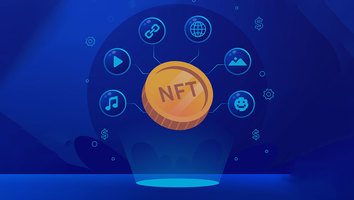In today's fast-paced and complex global marketplace, supply chain management plays a crucial role in ensuring the smooth flow of goods and services from manufacturers to end consumers. However, traditional supply chain systems often face challenges such as a lack of transparency, inefficiency, and vulnerability to fraud and counterfeiting. To overcome these limitations, blockchain technology has emerged as a game-changer, offering unprecedented opportunities for enhanced transparency, security, and efficiency throughout the supply chain. In this article, we will explore how blockchain technology revolutionizes supply chain management and its impact on various aspects of the process.
Blockchain is doing wonders in the financial sector but it is not limited to this sector only. Cryptocurrency is a good example that is associated with the success of blockchain and this is the reason why this technology is pulling the attention of other businesses as well apart from the finance sector. Blockchain is ready to help different organizations and industries by lowering their costs and enhancing overall performance. It can look after the security and track the visibility of variables to maintain a balanced supply chain management.
Understanding Blockchain Technology
Before delving into the specific benefits of blockchain in supply chain management, it's essential to have a clear understanding of the technology itself. Blockchain is a decentralized and distributed ledger that records and verifies transactions across multiple computers, ensuring transparency, immutability, and security. It consists of a series of interconnected blocks, each containing a set of transactions, which are chronologically linked together. The decentralized nature of blockchain eliminates the need for intermediaries and provides a trustworthy platform for recording and validating transactions.
Blockchain in Supply Chain Management
Blockchain technology makes use of smart contracts to program business logic for enhancing transparency right from the source point till the end. The technology can help in the accurate tracking of an asset while enhancing services, products, and software licenses. Organizations can use private, public, or hybrid blockchains depending on the requirement to bring about transparency, clarity, traceability, and accountability of the products.
Using this technology in logistics can enhance business efficiency while cutting costs from the supply chain to provide a better customer experience via transparency, traceability, and traceability. Supply chain management efficiency can also be increased with the help of this technology, as blockchain technology shared IT infrastructure is capable of streamlining the workflow for different parties irrespective of the size of the business network. A supply chain network comprises manufacturers, suppliers, retailers, distributors, auditors, and end consumers. The shared infrastructure allows auditors to check over the activities of the participants in the chain.
Enhancing Traceability and Transparency
One of the significant challenges in supply chain management is the lack of transparency and traceability, especially when dealing with complex global supply networks. Blockchain technology provides a robust solution by enabling end-to-end traceability of products and components. Each transaction or event related to the supply chain can be recorded as a block on the blockchain, creating an immutable and auditable record. This transparency allows stakeholders to track and verify the origins, movements, and conditions of goods at every stage, ensuring compliance with regulations and ethical standards.
Ensuring Supply Chain Integrity and Security
Counterfeit products and supply chain fraud pose significant risks to businesses and consumers alike. Blockchain technology offers a secure and tamper-proof solution to mitigate these risks. By recording every transaction and event on the blockchain, the integrity of the supply chain can be ensured. Smart contracts, self-executing agreements stored on the blockchain, enable automatic verification and validation of transactions, reducing the reliance on trust between parties. This eliminates the possibility of fraudulent activities, such as double-spending, unauthorized substitutions, or falsified certifications.
Streamlining Supply Chain Efficiency
Blockchain technology has the potential to streamline supply chain processes and eliminate inefficiencies. By providing real-time visibility and transparency, blockchain enables better coordination and collaboration among different stakeholders. It reduces paperwork, manual data entry, and the need for intermediaries, resulting in faster, more accurate, and cost-effective transactions. Smart contracts can automate tasks such as payment processing, inventory management, and compliance checks, reducing delays and human errors. Moreover, blockchain facilitates faster dispute resolution and reduces the time and effort required for reconciliations.
Improving Quality Control and Product Authenticity
Maintaining quality control and ensuring product authenticity are vital aspects of supply chain management. Blockchain technology can enhance these processes by creating an immutable record of product-related information, including certifications, testing results, and quality inspections. By integrating Internet of Things (IoT) devices with blockchain, data such as temperature, humidity, and location can be securely recorded at each stage, ensuring compliance with quality standards and preserving product integrity. Consumers can also access this information, enhancing trust and confidence in the products they purchase.
Sustainability and Ethical Supply Chains
Sustainability and ethical considerations are increasingly important for businesses and consumers. Blockchain technology can play a significant role in promoting sustainability in supply chains by providing transparency and traceability of product origins and manufacturing processes. By ensuring ethical sourcing and fair labor practices, blockchain enables consumers to make informed choices and support responsible businesses. Additionally, blockchain-based systems can incentivize and reward sustainable practices through tokenization and smart contracts, driving positive change in supply chain operations.
How is Blockchain Changing the Supply Chain Management?
The basic technology of the blockchain is a decentralized ledger that helps to record and protect the data that is shared among different parties. Supply chain management allows parties to carry out transactions with each other while maintaining security, decreasing costs, and emphasizing contract compliance. Supply chain blockchain technology makes use of tokens, rather than coins, to form unique and easily verifiable identifiers for purchase orders. Each person has a unique digital signature in the chain to sign tokens moving through the chain. Every transaction is recorded to maintain clarity.
Benefits of Blockchain in Supply Chain
There are several benefits that companies can experience while using blockchain technology in the supply chain, such as:
More savings- Cost saving is possible with blockchain technology as it helps in increasing efficiency and decreasing stock loss. The requirement for paper-based work and material is also reduced via means of digital sharing of resources and transactions. Paperless work lowers the cost as it puts away the material costs and the labor that is required to manage it.
Increased efficiency- A shared network infrastructure pushes a supply chain with blockchain technology for better communication and association among the different parties. Transparency and traceability help to avoid the chances of fraud. Complete transparency allows organizations to lower processing time and risk while enhancing efficiency.
Integration with other technologies- Blockchain can easily integrate with other digital technologies like automation, IoT, and others for better transparency, efficiency, accuracy and overall working.
Ethical- Blockchain is exceptionally well-known for its traceability and tamper-resistance qualities that allow it to know where the goods come from, where they go, and who accessed the goods. This helps to keep a check on the complete supply chain.
Role of Blockchain in Reducing Fraud Cases
A report by Global Brand Counterfeiting in 2018 gives a clear picture of the fraud cases due to online counterfeiting cases across the globe, estimated to be 323 billion USD (2017). Blockchain plays an important role here, as it allows us to verify a product for its accuracy. There are a lot of fraud cases in the form of documentation like certifications, diplomas, and others. Blockchain can verify the documents while maintaining transparency to overcome fraud cases.
Requirements for a Successful Blockchain Project
Some of the elements that make blockchain suitable for a particular supply chain project include the following, while any of the features not being in place can lead to project failure.
Exchanging data- Blockchain technology is extremely reliable when data needs to be exchanged among different parties that are not related to each other.
Integration- For a successful blockchain technology, it must be integrated with other technologies such as Tech Slack and existing ERP.
Trust- Blockchain allows you to trust the different partners involved in the project, as updates are done from different parties.
Data standard- A well-maintained and defined data process and standard help to maintain data accuracy, making the work of different partners easier. For example, Electronic Data Interchange.
Cost- All kinds of costs associated with blockchain should be considered. Blockchain transactions can have higher or lower costs, and the costs have a direct impact on the development of a project.
Good and equal value- If a good and equal value is given to all the partners for sure they will prefer this technology for the working process.
Conclusion
Blockchain technology is beneficial in the supply chain, as it focuses on key features like transparency, and traceability while streamlining product recall. Any digital or physical product can be easily tracked throughout the cycle. Transparency gives the benefit of a better view to the producers while tracking a product. Blockchain technology in the supply chain is also beneficial for regulatory compliance and reporting, as it provides real-time information. The technology is also capable of checking for genuine ownership and licensing. Blockchain in the supply chain will continue to transform the global economy because of its powerful potential that can change businesses in this competitive world. The advantages of blockchain development services in supply chain management are diverse and impactful. From increased transparency and traceability to enhanced efficiency, security, and collaboration, blockchain technology has the potential to revolutionize supply chains, making them more reliable, efficient, and trustworthy.



